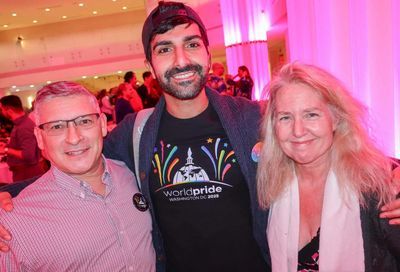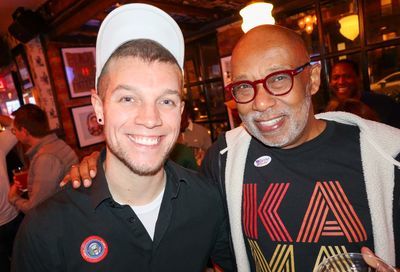Mayor Muriel?
The presumptive mayor-to-be talks about her vision for the District

With less than a week left before November’s general election, Ward 4 Councilmember Muriel Bowser seems poised for victory. She’s confident, eloquent, and flocked by hordes of volunteers and supporters donning her campaign’s trademark green T-shirts. More importantly, she’s the sole Democrat among a five-person field (independent Nestor Djonkam recently dropped out, endorsing her even as his name remains on the ballot) in a city where three-quarters of residents are registered Democrats. According to a recent Washington City Paper poll, she leads Independent At-Large Councilmember David Catania by 17 points and former Republican-turned-Independent Councilmember Carol Schwartz by 34 points.
Quick on the stump and talented in rousing crowds of party faithful, Bowser defeated incumbent Mayor Vincent Gray in the Democratic primary by campaigning on a platform of ethics and transparency while artfully exploiting concerns over an investigation looking into Gray’s involvement with a “shadow campaign” during the 2010 mayoral race. Bowser is running in a year when Democrats — including President Obama, who endorsed her — are unpopular. Despite this, she has established footholds across the city as part of her #All8Wards campaign, particularly focusing on disadvantaged and politically powerless communities within the District who are threatened by high unemployment, rising rents and burdensome property taxes.
Criticized for being overly cautious in public appearances — she was, for a while, eviscerated by the press for agreeing to only four debates or public forums against her opponents, and only after the general election ballot was finalized — it is clear that Bowser plays things close to the vest, a contrast with her two chief opponents, known for their larger-than-life personalities and their frank, at times sharp-edged, assessments of situations. Bowser presents a much more deliberative and even-keeled personality, maintaining her cool even as opponents and their supporters accuse her of having a thin résumé and an uninspiring record of leadership. She shoos away those criticisms, countering with a defense of issues she’s championed while on the Council, all the while taking her campaign to the streets, where, judging from the “excitement factor,” her supporters are eager to elect her as only the second woman to head the District government since former Mayor Sharon Pratt left office in 1995.
If all goes as expected, it’s that wave of support that will carry her to victory, allowing her to shape her vision for the District’s future and make her own mark on the Wilson Building.
METRO WEEKLY: You have a long relationship with the city’s LGBT community from your time on the Council. Who was the first person who came out to you as openly LGBT, and how did that shape your view of LGBT people?
MURIEL BOWSER: Well, my brother [Marvin]. I think that I’ve always grown up in a tradition of treating everyone equally, and not discriminating against anybody. And having the sense that our city, our government, all of our institutions should be open and fair. I have a very strong sense of fairness.
MW: You had previous government experience with Montgomery County prior to working on the Council.
BOWSER: Over 10 years. I’ve been in local government before I ran for office. Montgomery County, and also the Council of Governments, which is our regional body, of course.
MW: Montgomery County, specifically, has been at the forefront of the fight for transgender rights. Were you involved with any decision making on that front?
BOWSER: No, my experience in Montgomery County is largely in transportation funding and downtown development. I was most recently the director of the Downtown Silver Spring Redevelopment Office. I think I bring a lot of the best practices — and openness — that Montgomery County is known for with me, and have for the last seven years as a member of the Council.
I will say this: I have learned from the transgender community in the District, which I’m pleased to call on many people as supporters. And they, of course, are just as excited and proud, as we all are, that we’ve achieved marriage equality in the District of Columbia, but also know that there are significant issues that continue to face the LGBT community, in employment, in housing, and a focus on aging in place, just like for seniors all across the city.
MW: On that issue of employment for the transgender community, there have been some complaints about the way that Project Empowerment operates under the current administration. What do you see as the needed reforms to make Project Empowerment better, not just in terms of placement for temporary work, but finding participants permanent work?
BOWSER: Well, what I’ve heard from the transgender community is that the Gray Administration has gotten the ball rolling in the right way, focusing on how and why more transgender people aren’t employed by the D.C. government. It’s sad that we can count on one hand how many transgender people are employed by the District government. Project Empowerment is part of our workforce training program, but I actually think we need to totally transform our workforce development programs. We spend about 100 million dollars each year on job training that is not going to jobs,and I think we need to completely change our approach. There’s a few things, a few programs that we’ll change that I think will benefit the transgender community and all Washingtonians, and that is working with the people who do business with us, our contractors, and incentivize them to employ our residents that have significant barriers to employment.
MW: As you know, some transgender people have been denied employment because of arrest records relating to their involvement in survival sex. Looking at the larger issue of ex-offenders, or “returning citizens,” what needs to be done to incentivize contractors or employers to hire them?
BOWSER: Well, as you know, we recently passed “Ban the Box” legislation in the District of Columbia. I think we will begin to see its effect in the coming year. But in addition to that, I co-authored an amendment with Councilmember McDuffie that would take it a step further, that would actually say to employers, in fact, we want you to ban the box but we also don’t want you to check about criminal background until you’ve already made a conditional offer of employment. I think that’s important, because at that stage, we know that employers have looked at a candidate, think that the candidate matches the qualities they need for that particular position. And then, the employer, after they’ve made that conditional offer, would ask if any criminal background would preclude a person from taking that job, i.e. a bank robber can’t work as a bank teller. But aside from that, if the criminal history has nothing to do with the job in question, we, the Council, have sent a message that a private employer should hire that person.
MW: Would they be penalized for withdrawing that offer afterwards?
BOWSER: Well, I think that’s the next step. What we will be able to see is if there is a discrepancy, and make our Office of Human Rights a place to go for redress.
MW: Who do you consider your top advisors on LGBT issues, or your contact points, besides your brother?
BOWSER: Well, my brother is chairing our LGBT committee for the campaign, and has done a very good job. And in fact, we had an LGBT event on P Street, and what made me so proud was we had people from every background, every ward, gay and lesbian, and transgender, and the energy was just incredible. And so that makes me extremely proud.
We have a close circle: Khadijah Tribble is part of our circle. She lives in Ward 8, and has been an activist, certainly in the gay community. Chris Dyer. Jim Slattery, who works for me, and has been a leader in the LGBT community for as long as I’ve known him, and has done a really incredible job. The Stein Democrats, who endorsed our campaign and have continued to be very active in setting our agenda. In fact, I met with the Stein Democrats about something that’s very important to them, and that is a focus on senior aging issues. That has been important. I would also count Courtney Snowden as one of the people who has provided advice about how we move forward.
MW: Your co-endorsee.
BOWSER: Yes, my co-endorsee from the Stein Club.
MW: You’re running against two openly gay men. If you’re all identical or close to identical on most of the issues, why should the LGBT community specifically give its votes to you? You mentioned the Stein Club, but let’s say there’s someone who’s non-partisan, or not Democratic, and LGBT. Why should that person vote for you over Mr. Majors or Mr. Catania?
BOWSER: Because I’ll be a better mayor. For LGBT Washingtonians and everybody else. What’s important in this election is that we’re electing the kind of leader who will build on the progress we’ve made in D.C. Not go backwards. Not tear it apart. Not scream people down, but work with people on the real solutions that will take D.C. to the next level. And I think, across the city, you’ll hear people say that’s the kind of leader they want.
MW: You worked on the Council on a bill with Mary Cheh to address LGBT homeless youth. What more needs to be done to work with families to not displace youth and, talking about the broader issue, what resources need to be in place to help people avoid homelessness?
BOWSER: With a lot of our young people, what’s so disturbing is they’re being bullied in their homes, being bullied at school, being kicked out, and that’s why they’re not safe. And that’s why you see so many young people on the streets or involved in survival sex work.
Changing the tenor of our city, and changing the tenor of our churches, and schools, I think the mayor has a tremendous opportunity to do that using her bully pulpit. And making sure that I’m always communicating that this is a city and we are a people who are fair and just and treat people with dignity and respect. And using our ability, and my stage, to communicate to people about fairness, is important.
But having said all of that, young people know that they have to have safe places to go. So the schools have a tremendous opportunity to interact with them, and having nurses and social workers and counselors who understand how to refer children when they need help, is important.
And then, finally, we need more emergency beds. When all else has failed, we need to get kids in a safe environment. And so the bill that we worked on would make that part of this discussion of eradicating overall homelessness.
MW: One of the criticisms of your opponent, Mr. Catania, deals with his temperament. But there are some voters that seem to like his style. They liked a similar style under Adrian Fenty, and saw many of those qualities in him, being able to hold people’s feet to the fire, and hold them accountable. How do you convince those voters that you’re the best candidate to hold people accountable?
BOWSER: Holding people’s feet to the fire is my style of leadership. Belittling people, screaming at them is not leadership.
MW: Give an example of when you’ve had to call somebody out on the carpet for mismanagement or poor decision-making or inappropriate behavior.
BOWSER: Oh, I have done that for seven years. I lead a ward. And so every one of the directors has been in my office on some issue, whether it’s the police or DDOT or [the Office of] Planning and Economic Development, around our issues that are affecting the delivery of services to 75,000 people in my ward.
MW: One of the things that you might be called upon as mayor is to serve as the go-between for the police force and the LGBT community, and getting everyone to the table. Do you feel that your next director of the Office of GLBT Affairs will be able to do that successfully?
BOWSER: Absolutely. I think that office has to have a respected leader, who can galvanize all the agencies of the government to leverage our investments across the city of time, services, you name it, to make sure we’re improving the quality of life for LGBT people, so absolutely.
MW: What are your three or four major accomplishments that you’re proud of from your time on the Council?
BOWSER: I’m proud, in the last seven years, that I have advanced an agenda that makes Ward 4 residents proud. They’ve elected me three times. To go down to the Council to fight for educational investments across our ward, and we see more families choosing the public schools, which is a testament to our hard work and consistent leadership at DCPS for the past seven years. Moving forward, working with Chancellor Henderson, we can transform them with more middle school investments. I’m very proud that we’ve been able to invest in Ward 4 schools and their capital improvements, in their physical appearance, and we’ll do the same to the two high schools, and invest in a new middle school.
I’m also very proud of the economic development we’ve been able to achieve. People would often say that Georgia Avenue hadn’t changed much since the riots of 1968. And now we see more shopping, dining, small businesses opening. And we’ll have an incredible opportunity with Walter Reed. We’ll have affordable housing, senior housing, a jobs center, park space, as well as shopping and dining. So that’s very important for us, along with other redevelopment plans for other corridors in Ward 4 — 14th Street Heights, and Riggs Road and South Dakota Avenue and Kennedy Street.
I’ve also done a lot of work around senior issues. I represent a lot of senior citizens. We know, next year, 20 percent of D.C.’s population will be seniors — I extended our senior property tax to include more people. There’s more that we can do. I also got $200,000 in our most recent budget to study senior LGBT issues, so that DHCD [Department of Housing and Community Development] can work on that plan immediately.
We were able to get a very transformative ethics reform bill passed through the Council, which creates an independent board of ethics and government accountability, which funded the Open Government office to enforce FOIA and our open meetings laws, and to really send a strong signal that there’s a new sheriff in town, that no unethical behavior will be tolerated, from mayor, councilmember, or front-line employee.
Most importantly, I’m proud of holding all the government agencies accountable for making our neighborhoods premier neighborhoods. Our streets are safer. We’ve driven down violent crime, almost to extinction. There’s a lot of work to do, still, but we’ve done that. Families are moving to Ward 4, which is a testament to how we’ve improved the public facilities. It’s that type of energy and agenda around neighborhood issues that affect people’s lives that have really made the difference. There’s a range of things that I have worked on in the past seven years to make life for D.C. residents better.
For more information on Muriel Bowser’s campaign, including her policy positions, visit murielformayor.com.
DC Mayoral Candidates
Plus, meet the other candidates running for D.C. Council, Attorney General and State Board of Education
Video from DCTV
https://www.youtube.com/watch?v=fdDF0ejtwAQ
Support Metro Weekly’s Journalism
These are challenging times for news organizations. And yet it’s crucial we stay active and provide vital resources and information to both our local readers and the world. So won’t you please take a moment and consider supporting Metro Weekly with a membership? For as little as $5 a month, you can help ensure Metro Weekly magazine and MetroWeekly.com remain free, viable resources as we provide the best, most diverse, culturally-resonant LGBTQ coverage in both the D.C. region and around the world. Memberships come with exclusive perks and discounts, your own personal digital delivery of each week’s magazine (and an archive), access to our Member's Lounge when it launches this fall, and exclusive members-only items like Metro Weekly Membership Mugs and Tote Bags! Check out all our membership levels here and please join us today!






























You must be logged in to post a comment.